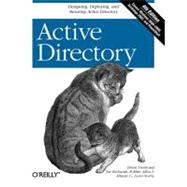
Brian Desmond spends his days focused on Active Directory for some of the world's largest companies. A Microsoft MVP since 2004, Brian brings extensive knowledge of how Active Directory works and how to successfully run Active Directory deployments large and small.
Joe Richards is a consultant/admin/tool writer and Microsoft MVP for Windows Server Directory Services. Joe updated the second edition of Active Directory Cookbook for O'Reilly.
Robbie Allen is an author, entrepreneur, web industry veteran, and new father. His day job has been in IT for the last 12 years. He is the coauthor of Active Directory, 2nd Edition and the author of the Active Directory Cookbook.
Alistair G. Lowe-Norris is an Architectural Enterprise Strategy Consultant for Microsoft UK. During the writing of the first version of this book he worked for Leicester University as the project manager and technical lead of the Rapid Deployment Program for Windows 2000. During his time there, Leicester was part of Microsoft's U.K. and U.S. Rapid Deployment Programs for Windows 2000, and was responsible for rolling out what turned out to be one of the world's largest deployments of Windows 2000 preceding release of the final product. Since 1998 he has been the technical editor and a monthly columnist for the Windows Scripting Solutions magazine and a technical editor and author for Windows & .Net Magazine (previously Windows NT Magazine and Windows 2000 Magazine). In addition he is an author and editor for various other publications and online sites worldwide. He holds various Microsoft and other accreditations and has been using Windows 2000 and its descendents daily since October 1997. He lives in Leicester, UK.
| Preface | |
| Intended Audience | |
| Contents of the Book | |
| Conventions Used in This Book | |
| Using Code Examples | |
| Safari<$$$> Books Online | |
| How to Contact Us | |
| Acknowledgments | |
| Active Directory Basics | |
| A Brief Introduction | |
| Evolution of the Microsoft NOS | |
| Windows NT Versus Active Directory | |
| Windows 2000 Versus Windows Server 2003 | |
| Windows Server 2003 Versus Windows Server 2003 R2 | |
| Windows Server 2003 R2 Versus Windows Server 2008 | |
| Summary | |
| Active Directory Fundamentals | |
| How Objects Are Stored and Identified | |
| Building Blocks | |
| Summary | |
| Naming Contexts and Application Partitions | |
| Domain Naming Context | |
| Configuration Naming Context | |
| Schema Naming Context | |
| Application Partitions | |
| Summary | |
| Active Directory Schema | |
| Structure of the Schema | |
| Attributes (attributeSchema Objects) | |
| Attribute Properties | |
| Classes (classSchema Objects) | |
| Summary | |
| Site Topology and Replication | |
| Site Topology | |
| How Replication Works | |
| Summary | |
| Active Directory and DNS | |
| DNS Fundamentals | |
| DC Locator | |
| Resource Records Used by Active Directory | |
| Delegation Options | |
| Active Directory Integrated DNS | |
| Using Application Partitions for DNS | |
| Aging and Scavenging | |
| Summary | |
| Read-Only Domain Controllers | |
| Prerequisites | |
| Password Replication Policies | |
| The Client Logon Process | |
| RODCs and Write Requests | |
| The W32Time Service | |
| Application Compatibility | |
| RODC Placement Considerations | |
| RODCs and Replication | |
| Administrator Role Separation | |
| Summary | |
| Group Policy Primer | |
| Capabilities of GPOs | |
| How Group Policies Work | |
| Managing Group Policies | |
| Troubleshooting Group Policy | |
| Summary | |
| Fine-Grained Password Policies | |
| Understanding Password Setting Objects | |
| Scenarios for Fine-Grained Password Policies | |
| Creating Password Setting Objects | |
| Managing Password Settings Objects | |
| Delegating Management of PSOs | |
| Summary | |
| Designing an Active Directory Infrastructure | |
| Designing the Namespace | |
| The Complexities of a Design | |
| Where to Start | |
| Overview of the Design Process | |
| Domain Namespace Design | |
| Design of the Internal Domain Structure | |
| Other Design Considerations | |
| Table of Contents provided by Publisher. All Rights Reserved. |
The New copy of this book will include any supplemental materials advertised. Please check the title of the book to determine if it should include any access cards, study guides, lab manuals, CDs, etc.
The Used, Rental and eBook copies of this book are not guaranteed to include any supplemental materials. Typically, only the book itself is included. This is true even if the title states it includes any access cards, study guides, lab manuals, CDs, etc.